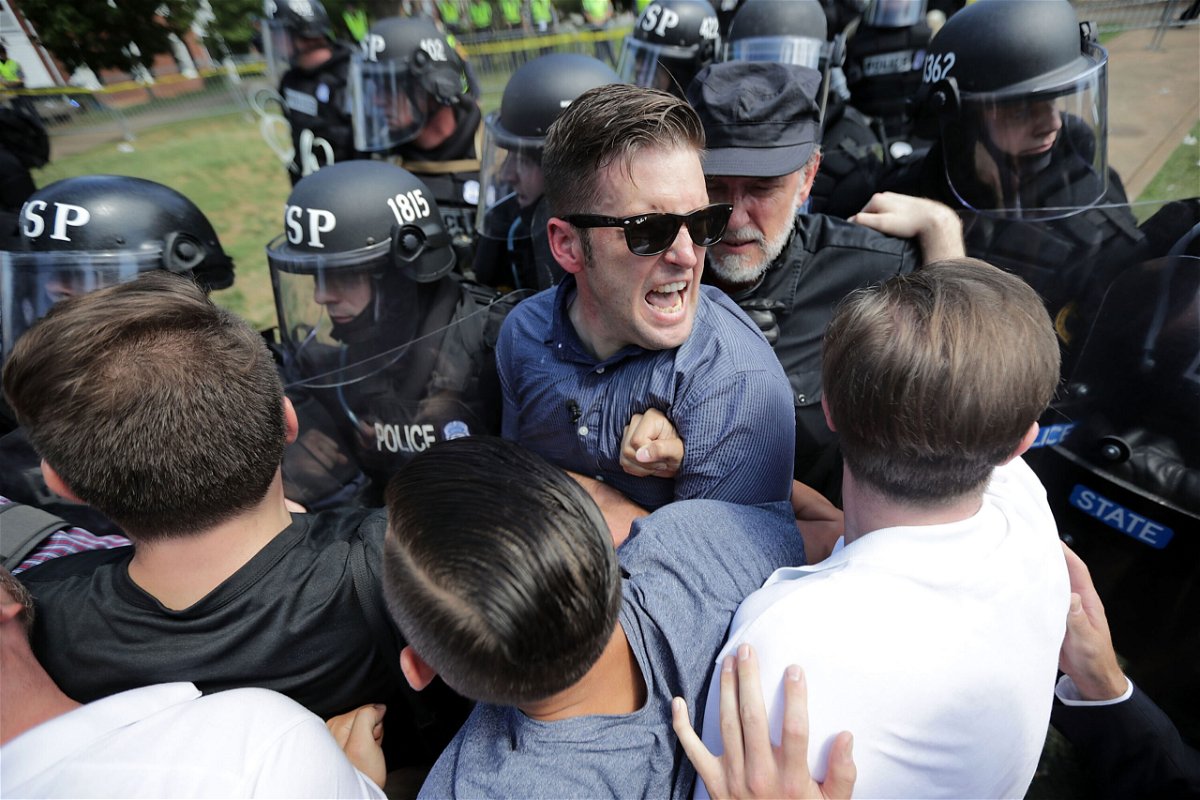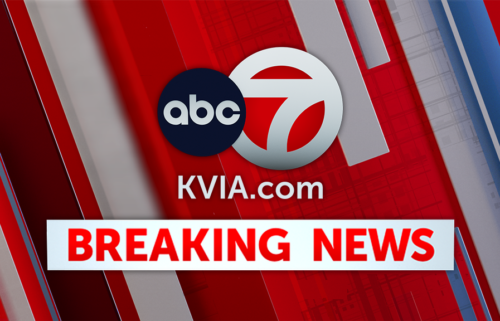Jury hears opening statements in trial over whether Charlottesville Unite the Right rally was intended to spur violence

Opening statements are set to begin on October 28 in the civil lawsuit filed against organizers of the 2017 Unite the Right rally in Charlottesville
By Mark Morales, Dakin Andone, Aya Elamroussi and Amir Vera, CNN
Opening statements began Thursday in the civil lawsuit filed against organizers of the 2017 Unite the Right rally in Charlottesville, Virginia — four years after one person died and dozens were injured in the chaos that ensued as White nationalists, White supremacists and counterprotesters clashed.
The violence — which surrounded a rally to protest the removal of a statue of Confederate Gen. Robert E. Lee — reached a crescendo when James Fields, who was protesting the statue’s removal, drove his car through a crowd of counterprotesters, injuring dozens and killing 32-year-old Heather Heyer. Fields is serving two concurrent life sentences.
Attorneys for the plaintiffs, who include city residents and counterprotesters injured in two days of clashes, laid out an overview of their case, which contends the organizers of the rally engaged in a conspiracy.
The plaintiffs, represented by a large team of powerful lawyers with the nonprofit Integrity First for America, are seeking compensatory and statutory damages for physical and emotional injuries they say they suffered.
“We are going to show you that the defense came to Charlottesville with a plan for violence with racial and religious hatred,” attorney Karen Dunn said Thursday, “and that they used race and religious hatred to motivate others to join.”
Among the defendants are 14 named individuals, including Fields, rally organizer Jason Kessler, Richard Spencer — the lead organizer for the August 11 torchlight rally — and Christopher Cantwell, who became the face of the rally after being featured in a Vice documentary.
The suit also names 10 White supremacist and nationalist organizations, including Moonbase Holdings LLC, the company that runs the Daily Stormer website; the League of the South, the Nationalist Socialist Movement and at least two chapters of the KKK.
The defendants say they did not initiate the deadly violence that ensued; they argue they were exercising their First Amendment right to protest. They also say there was no conspiracy and that the violence stemmed from law enforcement’s failure to keep the opposing groups separated.
“My attendance, my intention to speak boldly — it is implied that this led to chaos, that I am somehow liable for injury by my mere presence at the event,” Spencer said during his opening statement. “That is not fair, that is not an accurate application of the law and, to be honest, on some level, that is not serious.”
Twelve jurors were selected this week over three days.
Organizers aimed to fuel violence, lawsuit says
Four of the plaintiffs were struck by the car driven by Fields, the lawsuit says. Others claim they were kicked, punched or spat upon.
On Thursday morning, Dunn laid out the events of August 11 and 12, 2017, when White nationalists and White supremacists marched through Charlottesville and the University of Virginia campus chanting, “Jews will not replace us,” “You will not replace us” and “Blood and soil,” a phrase evoking Nazi philosophy on ethnic identity. They clashed with counterprotesters who gathered to denounce the march.
“The White nationalists climbed the steps of the rotunda at UVA and descended upon 20 to 30 unarmed counterprotesters,” Dunn said, adding, “They maced and physically attacked the counterprotesters. They screamed in their face, and they threw liquid in their face while wielding lit tiki torches.”
The next day, Dunn said, “They wore riot gear. They marched in formation, they carried shields that were later used to break through the counterprotesters and they carried flags that were later used as weapons.”
Dunn warned some of the evidence was graphic and contained violent images, and attorneys for the plaintiffs played a video of Fields’ car plowing through a crowd of counterprotesters — a moment Dunn said the defendants celebrated.
Dunn also laid out text messages, social media messages and posts she said showed the defendants had planned to turn the events violent, using flagpoles, shields and even cars as weapons.
“The evidence will show that the leaders of this conspiracy were very proud of what the battle of Charlottesville accomplished,” Dunn said, adding the defendants referred to the events of August 12 as a “huge success.”
Organizers of the Unite the Right rally had planned for a violent showdown from the start, the plaintiffs’ attorneys contend. Per the complaint, Kessler, the organizer, applied for the permit in May 2017, claiming the event would be a protest against the removal of the Lee statue, which the City Council had voted to remove. (Two Confederate statues that were the center of violence in 2017 were taken down in July 2021.)
Organizers chose Charlottesville so the debate and protest around the statues could serve as a catalyst for a race and religious war, the complaint reads. White supremacists, neo-Nazis and groups such as the Proud Boys and the Loyal White Knights of the Ku Klux Klan were in the city for events in May, June and July 2017.
While Kessler’s permit was for only August 12, the attendees began arriving August 11 and participated in the infamous torchlight march that resulted in counterprotesters being kicked, punched and spit on near the university’s Rotunda, the complaint reads. And the next day — the day Fields drove a car into the crowd — was more violent, with clashes all over the city.
Roberta Kaplan, another attorney for the plaintiffs, described what they had gone through, telling the jury, “No matter what they do and no matter how far away from Charlottesville they go, they continue to carry around the pain and trauma of Charlottesville.”
She alluded to a statement by Dunn earlier, telling the jury to remember “that the defense planned for violence, executed violence and then celebrated violence.”
Defendants distance themselves from each other
Spencer and Cantwell are representing themselves. CNN has contacted attorneys representing other defendants. Elmer Woodard, an attorney for three of them, declined to comment.
In delivering an opening statement Thursday on his own behalf, Spencer acknowledged he has “certain regrets about being involved with the rally.”
“But we are now here four years after the event,” he added. “Emotions have subsided and we are in a position to revisit the matter, look on it with clear eyes and apply the law accurately and fairly.”
Spencer equated his hate speech to “tough talk,” saying there was no concerted plan to attack anyone as he tried to distance himself from the other defendants, including Kessler, whom he said was the central planner of the rally. Spencer only agreed to speak at the event, he said, after a permit was secured and that Kessler said the police promised to be there.
He did not deny that the plaintiffs were hurt, but claimed it was the “strategy of the police” that was “ultimately responsible” for their injuries and suffering. (An independent review previously found authorities were unprepared for the event and failed to protect the public).
In his own wide-ranging opening statement, Cantwell similarly argued that he played no role in organizing the rally, saying he didn’t know the other defendants.
“I didn’t conspire to do any racially motivated violence, and I didn’t conspire to do any of this other crap, either,” Cantwell said. If the jurors pay attention to the evidence, he said, “I’m going to win this thing, no contest.”
Cantwell wrote a letter to the court last month saying he and his associates applied for a permit “to hold a demonstration” in 2017. Though they were denied the permit, they sued and won the right to protest.
“We were threatened with violence by the Plaintiffs’ co-conspirators, as we had been countless times before. But we relied on the police to keep us separate, as we had countless times before, and were left with little choice but to defend ourselves when the promised protection failed to materialize,” Cantwell wrote, adding an “army of Jewish lawyers” was behind the lawsuit.
Spencer downplayed the violent protests in a 2018 motion to dismiss the case, writing, “Harsh and bold words, as well as scuffles, are simply a reality of political protests, which are, by their very nature, contentious and controversial.”
The-CNN-Wire
™ & © 2021 Cable News Network, Inc., a WarnerMedia Company. All rights reserved.
CNN’s Elle Reeve contributed to this report.

